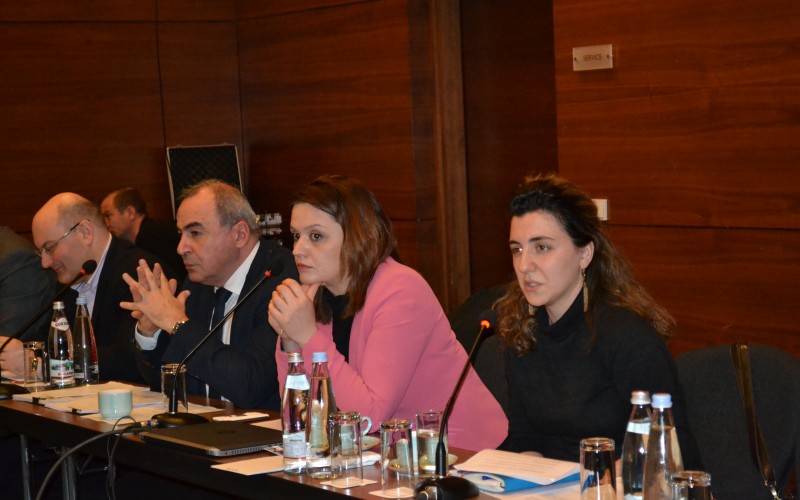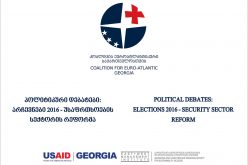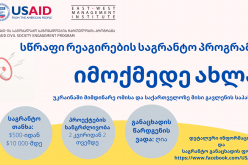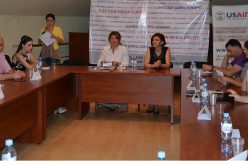EWMI ACCESS Hosts Open Discussion on Autonomy of Higher Education Institutions in Georgia

A recent tension at Tbilisi State University regarding student protests has put the autonomy of the higher education institutions back to the public agenda. Due to the salience of this issue in Georgia’s public dialogue, the East-West Management Institute’s (EWMI) “Advancing CSO Capacities and Engaging Society for Sustainability (ACCESS)” project organized an open discussion on March 30. The purpose of the discussion was to facilitate an open and constructive dialogue among various stakeholders and try to define solutions to the problems the industry is currently facing. Representatives of the higher education institutions, the government, CSOs and students groups took part in the discussion.
Representatives of the Free University defined notion of autonomy of higher education institutions and elaborated on legislative framework hindering the implementation of full autonomy in practice – given that the institutions are legal entities of public law (LEPL), state-founded universities, conversely, can be subject to governmental influence. Under such legal structure, the government has authority to abolish certain decisions taken by universities.
 The rector of Ilia State University provided a brief overview of the reforms carried out in the higher education sector over the past decade and stated that today’s government has significantly less power to influence university decisions – current legislation weakened the power of rector and introduced new management units (senate, academic council, representative council, chancellor, etc.) to ensure more decentralized management; however, as he stated, it is necessary to set clear demarcation lines between universities and the government in order to eliminate attempts of interference that still exist.
The rector of Ilia State University provided a brief overview of the reforms carried out in the higher education sector over the past decade and stated that today’s government has significantly less power to influence university decisions – current legislation weakened the power of rector and introduced new management units (senate, academic council, representative council, chancellor, etc.) to ensure more decentralized management; however, as he stated, it is necessary to set clear demarcation lines between universities and the government in order to eliminate attempts of interference that still exist.
Representatives of the student group “Auditorium 115” spoke about the need to reform management and decision-making mechanisms at Tbilisi State University. As they stated, the academic council and the student’s self-government should represent interests of all students. Therefore, the number of members of academic council should be increased, and the existing student self-government system should be reformed; student clubs should also be eligible to get funding from the administration. They claimed that the majority of students are not able to participate in the decision-making process; therefore they have to have no other choice but to organize rallies and street actions.
The Deputy Minister of Education and Science of Georgia stated that currently the government does not interfere in autonomy of universities; according to international surveys, the level of autonomy of universities in Georgia is above average. In order to guarantee academic freedom, the Ministry has established a rector’s council where current legislative initiatives are being discussed and agreed. He also spoke about deficiencies of current Laws on Higher Education and criticized the voucher-based financing system, which leaves little incentive to focus on the quality of teaching. In order to improve this deficiency, the new accreditation and financing system will be launched in 2017 and government will play larger role in assuring quality of teaching. As for the problems existing at TSU, the deputy minister stated that the government is mediating the p
rocess and it does not plan to interfere in internal management issues.
Representative of the Human Rights Education and Monitoring Center (EMC) spoke about problems related to existence of the  Security Liaison Officers at higher education institutions. According to legislative amendments, as of August 2015 there is no legal basis for having these officers at universities, however it is still unknown whether the officers have been recalled from their duties or not. As the EMC representative stated, public oversight over this institution is impossible, since its secret and closed for public. The only eligible entity that can get information on in this regard is the so-called “trust group” at the parliament, however the parliament has not been interested with this issue so far.
Security Liaison Officers at higher education institutions. According to legislative amendments, as of August 2015 there is no legal basis for having these officers at universities, however it is still unknown whether the officers have been recalled from their duties or not. As the EMC representative stated, public oversight over this institution is impossible, since its secret and closed for public. The only eligible entity that can get information on in this regard is the so-called “trust group” at the parliament, however the parliament has not been interested with this issue so far.
All parties agreed that a more decentralized management system and strengthening the independence of faculties is the main pre-requisite for de facto autonomy.
ACCESS will continue to provide platform for policy dialogue among various stakeholders in this field in the future.

















